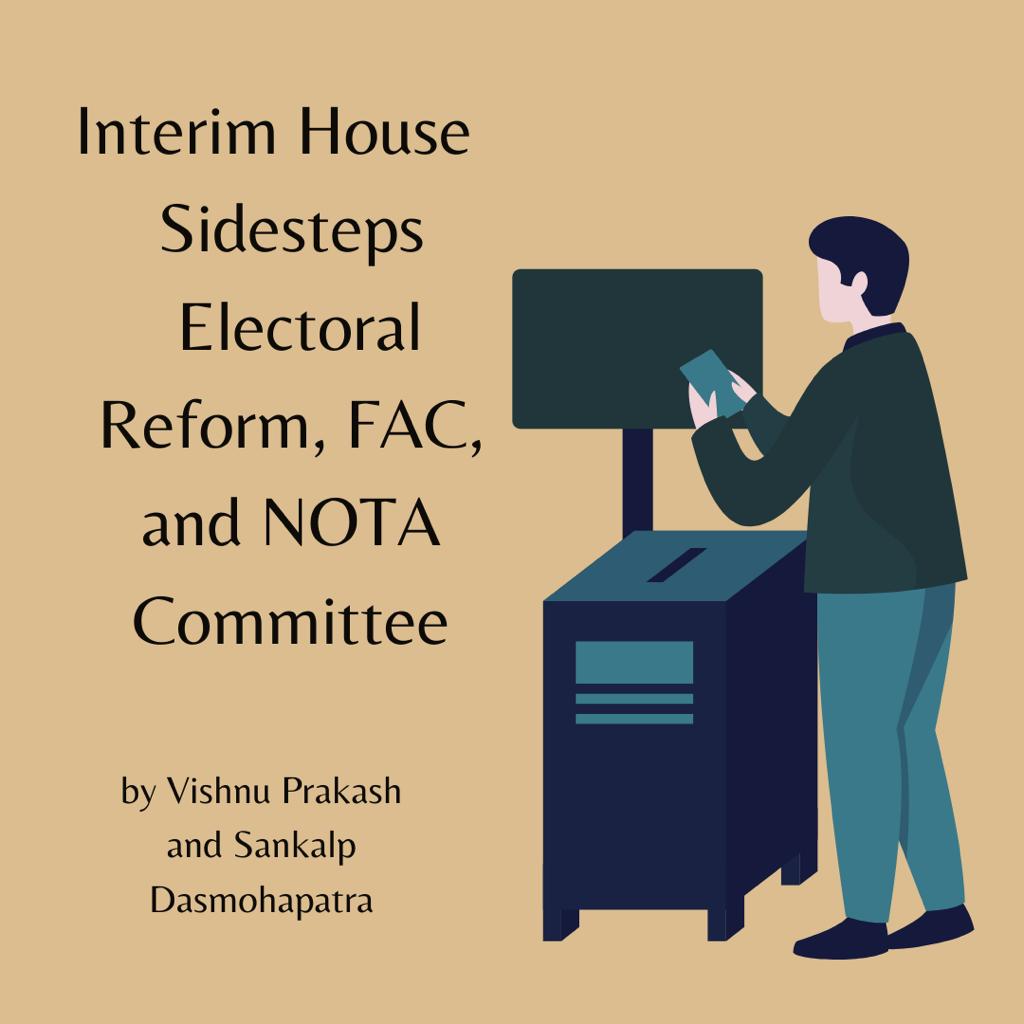
Interim House Sidesteps Electoral Reform, FAC, and NOTA Committee
By Vishnu Prakash and Sankalp Dasmohapatra
Note: As of 12th January, Sankalp is no longer with The Edict. He is running for the upcoming elections as a candidate with Ashokan Socialist Syndicate.
In an interview conducted on the 30th of November by The Edict, the House of Representatives (HoR) admitted that it would not pursue electoral reforms in the run-up to the elections in February. The Edict interviewed members of the HoR to get an understanding of their achievements since the by-elections and of their plans until the House’s dissolution.
In the campaigning period before the by-elections, candidates made promises of electoral reform – more specifically a change in the current modified Swiss-PR system. When asked about these promises, members replied that it is the responsibility of the AUEC and not the House to propose electoral reform according to Article V Section 10.3 of the Constitution. The mentioned section bars the House from changing the electoral system. The Constitution mandates that the EC proposes reform, which must pass in a public referendum, which in turn is ratified by the House.
There was much discussion over the actual role of the interim House, and given that it is at half its capacity, members such as Rhea felt that the House’s focus should be logistical – instituting small reforms wherever possible. Newer members like Neha Sheik and Shreya Jain who had promised big reforms in their manifestos stated that while during the by-elections they were under the impression that they would be able to institute reforms upon entering the House, the conditions that prevailed barred them from doing so. Since then, the House has become a logistical body, taking on more administrative duties than legislative.
The Edict spoke to former President and former member of the SG, Ruhaan Shah, on this matter. “By deciding to not even address any of the pitches that they made earlier, they are being poor representatives, especially to those who voted for them,” Ruhaan said. Ruhaan adds that, “Changes to the electoral system do come within the HoR’s mandate as they need to be the conduit between the EC’s vision and the student body. For example, when the modified Swiss-PR system was being introduced, the HoR was also involved in the entire referendum, information dissemination process. Additionally, the HoR is supposed to vote on any proposed amendments to the Electoral Code. If they are not going to be involved in the decision-making process of electoral reforms, how is one to ensure that their vote is informed and not simply a bureaucratic measure? The goal of the HoR is to represent student interests, and electoral reform is very much one of them.”
As of now, the House has not yet publicly requested the AUEC to propose changes and put it to referendum. When asked again to clarify their stance on electoral reform, the House made it very clear to The Edict that they will not pursue electoral reforms before the February elections.
Another reform that was widely discussed within the student body was that of the Freshman Advisory Council (FAC). Since the 15th of September, the student body has received no news of the FAC or its status of implementation. Acting-President Neha Sheik mentioned that the composition and mandate of the FAC have been drafted by the President’s Advisory Council. However, with regards to its implementation, she mentioned that given the term limit of this House, it was unlikely that the FAC would be implemented this term and that any material regarding it would be handed over to their successors following the February elections.
The seeming inactivity of the House followed what appears to be an alarming trend of disengagement with campus politics. The current members were voted into the House under odd circumstances, to say the least, with almost 800 freshmen being barred from voting and an unprecedented, high number of NOTA votes. Newly sworn-in Leader of Opposition (LO), Rochan Mohapatra, maintained that he had no doubts about the legitimacy of the House, despite being voted in by a reduced electorate. He further went on to say that he is proud of the achievements of the Interim House and that given the circumstances, they have achieved a lot.
The Constitution provides a solution to the NOTA situation, and that is the formation of a NOTA committee – which the House was unable to do. The HoR justified their inaction by informing The Edict of the resignation of the then LO Advaith Jayakumar (which had not been announced yet), who would have had to be a part of this committee. At the time, they chose not to elect a new LO between the two remaining members of the opposition and confirmed to The Edict that this committee would not be formed. The House has since elected Rochan Mohapatra as the new LO on the 4th of January.
